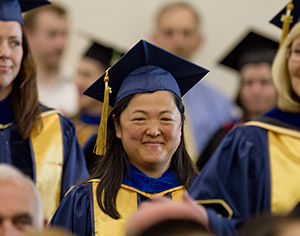Alumni distinction
Doctoral graduate places patients at heart of virtual network to improve research practices

Katherine Kim
Katherine Kim began her career in clinic management, moved into software development and eventually landed in research. Kim is not a nurse. She earned a master’s degree in public health and a master’s degree in business administration. Marrying those three disciplines as a graduate student in the Nursing Science and Health-Care Leadership Doctor of Philosophy Program at the Betty Irene Moore School of Nursing at UC Davis allowed her to draw on her experiences and knowledge for her dissertation. Kim united health-care stakeholders to create a framework for research that puts those who receive care at the center of the health-care equation, lending a voice that could transform how health information is collected in the future.
In order for anyone to receive health care, he or she must be part of a larger network. Based on that universal concept, Kim focused on mobile, social and network health care in order to create a technological framework and the rules to govern that framework for people to receive effective care.
“Health care doesn’t happen in one place at one time,” said Kim, who earned her doctoral degree in December 2013. “It’s a web of relationships and interactions taking place across time and locations. Network technology allows you to link people and information, and organize those connections, to improve health.”
In the past, researchers have designed research and technologists have designed systems with limited consultation of clinicians and those receiving care. Kim recognized that in order to create an effective network, research must not only define the parameters of what data is used, but also consider whose input is taken into account in the decision-making process. Since the various disciplines are rarely seated at the same table, Kim used technology to bring stakeholders together around one virtual table.
Kim participated in a project led by UC San Diego and comprising all of the University of California system hospitals, including UC Davis, the Veterans Health Administration, and numerous community clinics. Researchers used health records of 21 million people to make research more efficient and centered on those receiving care.
“Through patient focus groups and input from various health systems, we were able to create the blueprint for setting up a technological solution that collects data from various stakeholders and improves health-care systems,” Kim, now and assistant professor at the School of Nursing, added. “Now we’ve moved into the second phase where a virtual panel of clinicians, researchers and patients will determine what research questions will be studied.”
Kim’s project is one of 29 research networks currently funded by the Patient-Centered Outcomes Research Institute. Once this phase is completed, the networks will be eligible for institute funding to move from concept to reality and conduct the studies that stakeholders nominated.
“The School of Nursing’s focus on interprofessional and interdisciplinary collaboration really fostered an engaged way of working, which is what patient-centered care is all about,” Kim said. “My long-term hope is that we’ll find a way to bring all stakeholders into decision-making roles in order to determine what research is done, how it’s done and how the results are shared.”





